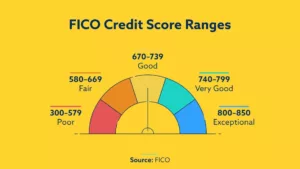Major card issuers typically provide an online portal where consumers can check if they are likely to qualify for a specific credit card without impacting their credit scores.
But what happens after the initial soft credit pull?
Most often if you initially qualify, you’ll be required to complete a full credit card application.
While credit card companies don’t reveal exactly what they look at when reviewing applications here are top tips that can help you get approved for a credit card.
8 Top Tips To Get Approved For A Credit Card
1. Know Your Credit Score
Before applying, check your credit score and credit report from all three major bureaus (Experian, TransUnion, Equifax). A higher credit score improves your chances of approval. Scores 680 and above are generally considered a good credit score. Errors can decrease your score, so fix credit errors.
2. Apply Strategically
Choose cards targeted towards your credit score range and financial goals. Research pre-qualification tools to see if you’re likely to be approved without impacting your score. When you select a credit card that aligns with your credit profile your likelihood of approval increases. Some cards are designed for individuals with excellent credit, while others are more suitable for those with fair or average credit.
3. Minimize Recent Applications
Applying for multiple cards in a short period can raise red flags for lenders. Space out your applications, ideally by at least 6 months.
4. Demonstrate Steady Income and Employment
A stable income and longer employment history demonstrate your ability to manage credit responsibly and repay debt. Banks often prefer applicants with a stable income. Being employed consistently can enhance your creditworthiness. Having steady income and employment is also important if you get denied but decide to request reconsideration from bank.
5. Keep Credit Utilization Low
If possible, reduce your existing debt before applying for a new credit card. Lower debt levels make you appear less risky. Banks want to ensure that you can handle additional debt so aim to use less than 30% of your credit limit on existing cards. Really, using 10% or less will get you the best scores but paying down balances before applying can significantly improve your chances.
6. Pay Bills On Time
A history of on-time payments across all bills reflects strong financial management and boosts your creditworthiness. Late payments can negatively impact your credit score and decrease your chances of approval. Consider auto-pay to avoid late fees and score drops.
7. Have A Checking Account
A bank account shows financial responsibility. But a checking account at the credit card issuing bank may improve your chances of getting approved for their credit card. In some instances such as secured credit card, it may actually be a requirement to have a checking account at that bank.
8. Build a Diverse Credit Mix
Having a mix of credit products like student loans, mortgages, and secured loans alongside credit cards showcases responsible credit usage and strengthens your credit profile.
Final takeaway
Lastly, make sure you review your application details and double-check all information entered to avoid errors or inconsistencies that could lead to denial.
Credit usage requires good management habits to maintain a good credit score and long-term financial health. Only apply for cards you can afford to manage and repay in full each month to avoid accumulating debt and interest charges.
Common reasons for rejection include low credit scores, high levels of debt, a history of late payments or bankruptcy, and insufficient income.
Remember, each credit card issuer has its own approval criteria, so even if you’re not approved for one card, you may still be eligible for others. Be strategic in your approach and only apply for credit cards that align with your current credit category, i.e. excellent, good, average, fair, or poor.


















